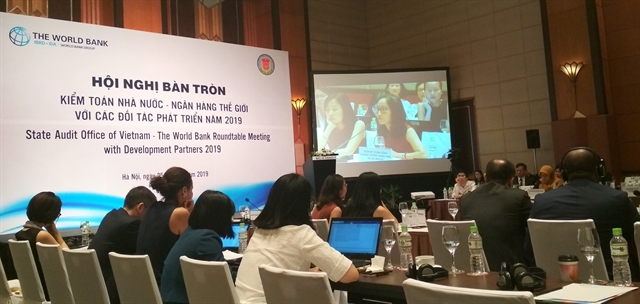State Audit of Viet Nam to concentrate on IT and environmental audit
2019/06/26

Participants at the Q&A section in the State Audit of Viet Nam -World Bank Roundtable Meeting with Development Partners held in Ha Noi
The State Audit Office of Viet Nam (SAV) would give priority to new audit areas such as information technology, tax and environmental protection in its development strategy from 2020 to 2030, said the SAV’s Auditor General Ho Duc Phoc
Speaking at a roundtable between the SAV, World Bank and development partners organised yesterday in Hà Nội, Phoc said that during the period, the SAV would also implement new risk-based auditing methods.
“The SAV confirms its commitments and top priorities to the changes, aiming to become more modern and professional,” he said.
For Viet Nam, environmental audit is quite a new concept both in terms of awareness, definition and practical delivery but has been included in its policies, laws and environmental protection practices, especially after serious environmental incidents like the massive fish death caused by Taiwan-invested Hung Nghiep Formosa Ha Tinh Steel Co Ltd (Formosa) in four central provinces in April, 2016.
Le Dinh Thang, head of Specialised Audit Department No III said that until now, the delivery of environmental audit at SAV was modest.
It has mainly undertaken audits of financial statements and assessment of cost-effectiveness and efficiency of some national target programmes related to the environment.
These audits initially produced assessments of effectiveness and efficiency in budget, management and use of public funding and commonly adopted financial auditing and compliance auditing. They gave little attention to assessment of environmental impacts of the projects or programmes, so giving insufficient grounds for audit recommendations to further environmental protection.
Thang said in the near future, SAV expected the Law on State Audit would be amended so that SAV would be tasked with environmental audit according to international practices.
Legal basis, documents and databases related to environmental audit would be completed, he said, adding that a database on environmental audit focusing on waste, forest resources, biodiversity or climate change would be developed.
Fily Sissoko, East Asia-Pacific Regional Manager-Governance at the World Bank said that Việt Nam was a country on the move and was rising at the regional and global level with an impressive growth rate, poverty reduction and improved sovereign credit rating.
However, the transition to high middle-income status would require greater transparency and accountability, improvement of the system of checks and balances, he said, adding that the role of SAV was key to ensure better development of outcomes and sustainable equitable economic growth.
SAV’s priority areas were aligned with Viet Nam’s ambitions to modernise its public financial management systems and transition to high middle-income status. They were also aligned with the World Bank country partnership strategy for Việt Nam – disruptive technology and environment.
“The rapid pace of technological change continues to disrupt traditional procedures in audit, public financial management, Government’s transactions from tax collections to spending and management of assets and liabilities,” he said.
“These technological changes require new skills from both public and private auditors, more advanced tools and different audit methodologies and risk assessment methods.” he said, adding that the World Bank and DFAT were supporting the Government’s Office to implement the Government’s strategy on e-government.
In terms of environmental audit, Fily said that SAV had a major role in ensuring that performance audits include a review of policies and programmes so that their environmental and social impacts were properly assessed and mitigated.
Together with the World Bank, other participants at the roundtable including the Asian Development Bank, Association of Chartered Certified Accountants and Institute of Chartered Accountant in England and Wales also applauded SAV’s priority areas and committed co-operation.
